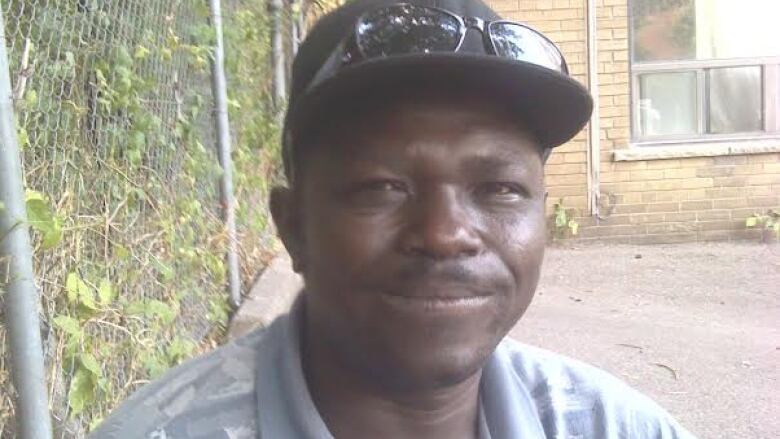Andrew Loku coroner's inquest decision was influenced by protests
Inquest will not assign blame, but officers involved in fatal shooting will likely be identified

The decision to call a coroner's inquest into the police shooting death of AndrewLokulast summer happened partly in response to public protests, a supervising coroner said Thursday on Metro Morning.
- Ontario calls inquest into police shooting death of Andrew Loku
- Black Lives Matter demands Toronto police apologize for Andrew Loku's death
Dr. Jim Edwards, a regional supervising coroner for Toronto east, said public protests by Black Lives Matter and othersdid influence the decision.
"It wasn't the only factor, but certainly it was one factor that we took into consideration," Edwards said in an interview with host Matt Galloway.
Loku, 45, was shot aroundmidnight last July 5 in the third-floor hallway ofan apartment complex near Rogers Road and Caledonia Road, in the city's west end. He had refused to comply with police demands to drop a hammer he was holdingand threatened to kill a friend of a guest in the apartment.
The officer who shot Loku and a second officer had entered the building and confronted Loku, with guns drawn, in thehallway.
Last month, Ontario's Special Investigations Unit, which probes all incidents whensomeone dies during an interaction with police, determined that the officers' actions were justified under the circumstances.
That decision prompted protests outside police headquarters by the Toronto chapter of Black Lives Matter.
Inquest does not lay blame
Edwards pointed out that a coroner's inquestis a very different process thana criminal trial: It does not lay blame or assign legal responsibility for the death. In Ontario, an inquest is apublic hearing conducted by a coroner before a jury of five community members.
Such inquests are called mainly to develop recommendations, make public the circumstances of the death and have specific questions about what happened answered forthe jury. The jury's conclusions are not binding, but made with the goal of informing the public and government and to prevent similar deaths in the future.
Police officers called to the inquest, however, will be required to testify, which means they will also be identified publicly.
Many Black Lives Matter protesters have been critical of theSIU investigation process, which happens largely in secretwith subject officers' names not made public.
Galloway asked why the coroner's inquest is being called now, eight months after Loku's death.
'Great deal of public interest' in Loku's death
He said the coroner's office wanted to review information from the SIU report.
"We were aware that there's a great deal of public interest into the circumstances of Mr. Loku's death, which was part of our decision making," he said.
Edwards also said correspondence from many individuals, including former Toronto Police Services Board chair Alok Mukherjee, also played a role.
Edwards said the next step is that an investigator will work with a presiding coroner, who has not yet been named, before a date for the inquest is announced. This process will take "some months," he said.
The presiding coroner will also decide how wide thescope of the inquest will be.
For example, a thorough look at police procedures, racism in the police force and how officers interact with emotionally disturbed persons may fall outside the scope of the inquest.
"It's not a public inquiry, it's not a royal commission, it's a focused inquiry into the death of a member of our community," Edwards said.












_(720p).jpg)


 OFFICIAL HD MUSIC VIDEO.jpg)
.jpg)



























































































